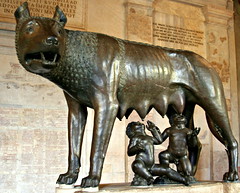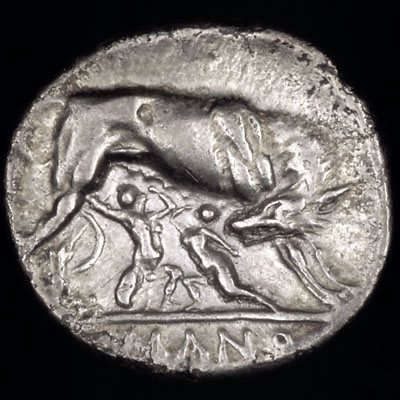The Roman Republic was during the period of ancient civilization where the areas surrounding and in much of Europe functioned as a republic. This video explains the expansion of the Roman Republic since around 508 BC. The first 1:37 minutes are the most relative, and it helps to read the footnotes.
The mythical start of Rome goes something like this. In Alba Longa, in the plain of Latium, Numitor, the king, is overthrown by his brother, Amulius. Amulius murders his brother's children, but spares his niece, Rhea, whom he makes a "vestal". Which means that she was sworn to celibacy, and therefore could not have children whom might take vengeance on Amuluis. But, Rhea ends up giving birth to twins, Romulus and Remus. She claimed that the god Mars seduced her.
Rhea is told to have been punished for breaking her vows by being buried alive. The twins were put in a basket and thrown into a flooded river. The basket, somehow, floated to a nearby shore and was discovered by a female wolf that nursed them for a short time until they were found by a man. This farmer raised them as his own.

When Romulus and Remus grew up, they decided to found a city around where they had been found by the wolf. The brothers fought over where the site for the new city should be but Romulus ended up killing his brother and became the sole founder of the new city which he named after himself. This new city was Rome.
This story, of course, is a legend, but in the Roman Republic it was widely accepted as the real story of the start of Rome. Because the Roman Republic was so widespread and because this story was so commonly accepted, there are changes in the myth.There are many adaptations and versions of this story, with some having greater detail than others, and even though they have the same plot, the differences occur because the story was passed down orally.
 This myth was so widely accepted that coins were even made that had the above picture of Remus and Romulus feeding from the female wolf on them. An old Roman saying states, "Men are wolves to men", which derives from the myth of the founders of Rome feeding from the milk of the wolf.
This myth was so widely accepted that coins were even made that had the above picture of Remus and Romulus feeding from the female wolf on them. An old Roman saying states, "Men are wolves to men", which derives from the myth of the founders of Rome feeding from the milk of the wolf.
The myth was a way of making sense of the creation of Rome. Since no one knows for certain, it makes sense that a legend was created.
Good post Maddie. I loved that you used part of the oral knowledge of this culture, see myths and legends to tell us more about the culture. Even though our country was founded in the era of writing and print do we perpetuate some founding myths?
ReplyDeleteGreat introduction to your civilization. I think a lot of countries have founding myths, though they may be a little less spectacular for countries founded recently. Do the myths of a culture describe that culture? If so, the Romans were definitely violent and didn't have many issues with killing your own kin in order to gain power.
ReplyDeleteEmily, I think if the myth comes from the culture is probably upholds many of the ideals/customs that define that culture. For example I'm finding that some of the founding myths for the Navajo help to define their culture.
ReplyDeleteVery interesting post! How exactly do myths affect the belief system of a culture? I'm interested to see how the saying "men are wolves to men" ties into the belief system of the Roman culture.
ReplyDeleteErin, I totally agree, I think that this myth in particular, was most likely created by the cultural values of the time. It tells a bit about their culture that it was such a commonly accepted story.
ReplyDeleteKimberly, the common saying ties in since the myth of Romulus and Remus was so widely and deeply accepted that there were many byproducts of it. The coins are included in this too.
One of the interesting things I've found is that this is one of the few creation stories that doesn't involve a god or gods. For example, in the creation story for the Navajo, that I'm researching, the gods, or spirits, are central to the story. Yet we see none here, why do you think that is?
ReplyDeleteWell, I don't know if this counts but Romulus and Remus' daddy was supposedly the god Mars.
ReplyDelete